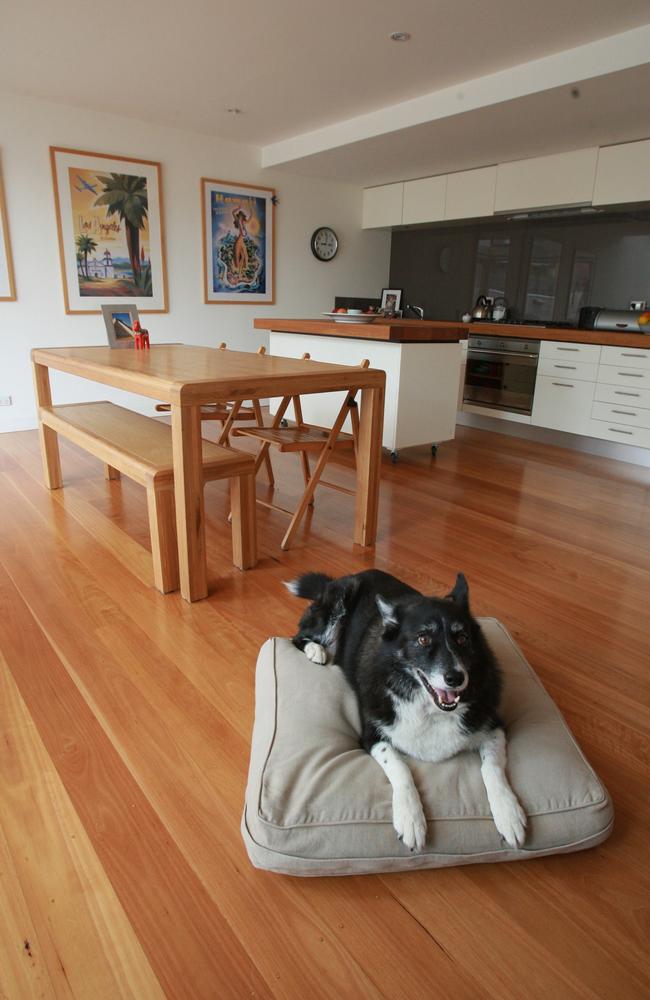Qld laws compel landlords to allow pets in apartments
New Queensland laws taking effect next month allowing tenants to keep pets in apartments could lead to a flurry of legal battles with unhappy landlords, experts warn.

A dogfight is looming over new laws allowing tenants to keep pets in their apartments against the wishes of their landlords.
New pet laws that come into effect throughout Queensland next month will give tenants the whip hand, with property owners having limited reasons to decline requests for pets.
One of the state’s leading strata property experts expects a flurry of costly legal battles.
Chris Irons from Strata Solve expects a rush by renters to get pets. And he warns of pushback by landlords.
Irons said whether or not there should be any restrictions on pets in apartments was one of many vexing problems facing the strata industry.
Years ago I visited a friend who had a pet snake slithering under the sofa, and I found it all a bit unnerving, even though I was assured it was friendly and not venomous.
These days it’s anything goes. Cats and dogs make great pets, but should they really be allowed in high-rise apartments at all? One family recently drew flak for keeping ducks on their balcony where they were being fattened for the pot.
Dogs that bark and leave their calling cards in shared space in apartment blocks create a legal minefield for the body corporates.
“There are now 55,000 strata schemes and they are growing by 3-5 per cent a year,” Irons said.
Irons said there were now 520,000 apartments in the state. He expects disputes over pets to increase.
“This will be a huge issue in Queensland,” he said.
“From October 1 in Queensland, tenancy laws will change to make it easier to have a pet in a tenancy.

“It means a renter can seek the property owner’s permission to keep a pet, and property owners can only refuse a request on identified reasonable grounds, such as keeping the pet would breach laws or by-laws.
“The property owner must respond to a request for a pet in writing within 14 days, or consent is implied.’’
Irons, 52, speaks with authority as a former state Body Corporate and Community Management commissioner.
“Under the terms of the new regulations, an increase in rents or a pet bond for tenants who want to keep a pet are not regarded as reasonable conditions.
“But the problem is, the body corporate must still and separately approve the pet, and they have as much as three months to make that decision. At which point, it is a deemed refusal – unlike with the landlord.
“The potential for confusion and dispute becomes very high given the two very different approval processes. And while it is rare, a body corporate can, in some cases, quite reasonably refuse to allow a pet.”
The delay made it even more difficult for pet lovers seeking rental accommodation.
“Tenants under pressure to move in quickly and beat high demand for rentals might find they cannot bring Fido or Whiskers immediately as well,” Irons said.
“They might then have to commence time-consuming, costly and stressful legal proceedings just so they can have their animal join them.
“To be frank and for want of a better term I am expecting a cat fight between some owners and their tenants.
“I expect that many renters will want to see pets allowed in their apartments and I also expect a lot of push back from owners. It has the potential to cause friction between body corporate committees and individual owners.”

Irons pointed to a case in NSW that ran for five years and ended up costing the owners’ corporation of a luxury high-rise $500,000 in a failed attempt to evict Angus, a miniature schnauzer.
Angus’ owner Jo Cooper, a singer-songwriter, argued that a by-law banning pets in the Harry Seidler-designed Horizon tower in Darlinghurst where she and Angus lived was unfair. The court decided the by-laws unlawfully restricted Cooper’s “lawful use” of the building.
In its decision the Court of Appeal overturned a previous decision of the NSW Civil and Administrative Tribunal Appeal Panel and deemed any by-law that provided an outright ban on pet ownership was “oppressive”.
The Appeal Court decision has made it clear that by-laws providing a blanket ban on pets will likely be found to be invalid. Angus died not long after the decision.
Irons said disputes involving pets in units were often fiercely contested because pets were viewed as members of the family.
Others saw them as an unpleasant annoyance.
Irons said there were nearly 2000 complaints a year to the Queensland Body Corporate Commission. About a third of those complainants were legally represented.
“Disputes will be settled somehow, usually with the legally binding order from a government-appointed adjudicator,’’ Irons said.
“If one or both sides do not agree they can appeal to QCAT.’’
To be represented there will cost around $10,000. But a case may run to $50,000 or more if it gets complicated.
And if you want to challenge a QCAT decision in the Supreme Court, you can. The cost? The sky’s the limit, he said.





